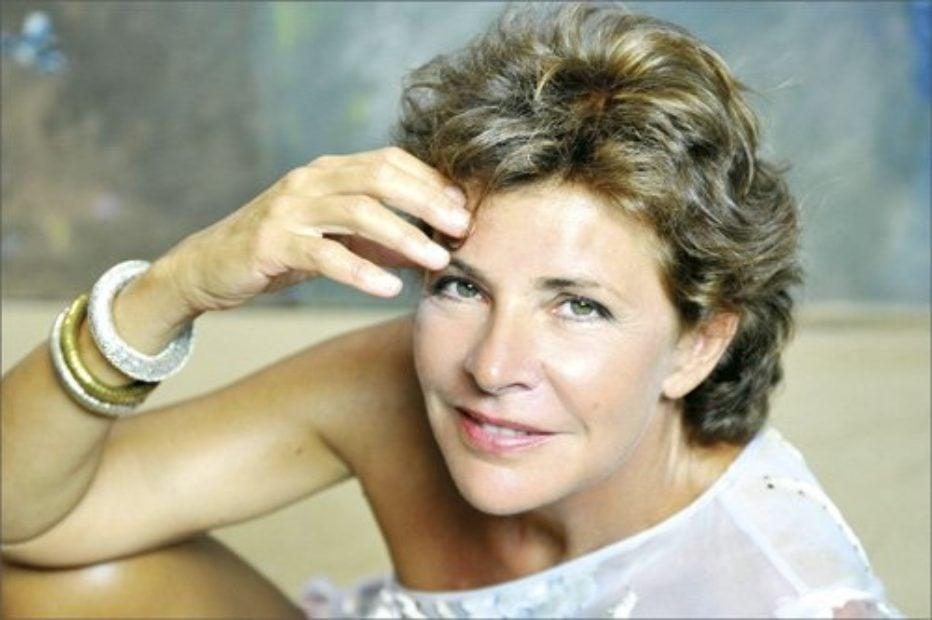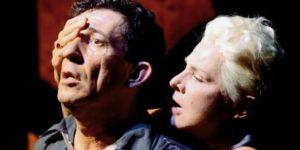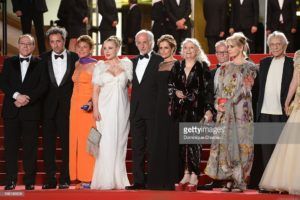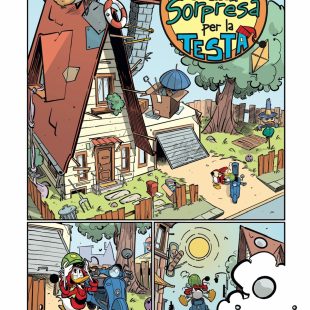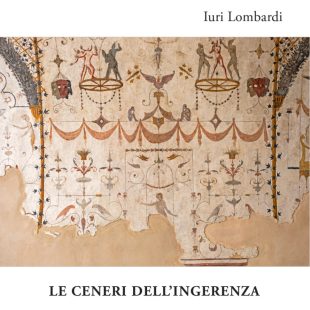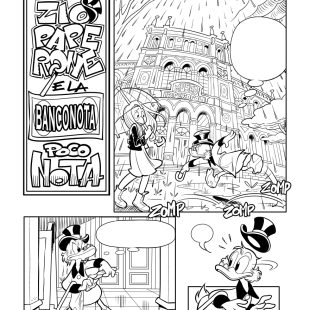Intervista a Pamela Villoresi
Interview by Dianora Tinti
(published in the monthly Maremma Magazine )
****
On a warm autumn afternoon, I walk along the panoramic road that surrounds the Argentario promontory in the province of Grosseto like a ring .
I stop to admire the view while a small sail cuts the slice of sea in front and two seagulls chase free in the air. In front of the island of Giglio.
When it is clear, even the houses of the small island port can be distinguished.
I watch the coast more closely. The hand of man has transformed many rugged declines into green and fertile terraces inhabited by vines and olive trees but, apart from those, every corner still speaks of romantic conventions and secret meetings of smugglers. It’s really hard to resist such a malice …
Not even Pamela Villoresi, one of the most famous Italian actresses of theater, cinema and television, has succeeded in making Argentario the favorite place to live.
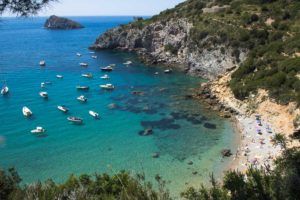
Monte Argentario
For many years she has had her retreat in Maremma, at Argentario . A choice or a case?
“The fault” is from my husband Cristiano.
Like many Romans he has always been attracted to that kind of island that is the Argentario, which he frequented since he was a child. I, however, belonged to that part of Tuscany (was born in Prato, ed) that did not “descend” until Maremma, at most it reached Castiglione della Pescaia . I met Cristiano very young , in Istanbul, and we decided to get married, to have a child and to have a home in touch with nature. I thought more of the countryside, he insisted: the Argentario!
I remember that in our tour of the promontory we met an old man on board an ‘ Ape Piaggio (the “lapino” called him) who asked us what we were looking for. He was deaf like a bell; finally understood that (maybe) we were looking for a house, he accompanied us to see one that he knew for sale. In short … it was not that, but one next to it that became ours.
The inhabitants of the Argentario are very different from the Maremma. In your opinion, in what and in which aspects are you most appreciated?
They are islanders. Even the Gigliesi obviously are, but they have a more open and cheerful character. The santostefanesi, on the other hand, resemble the elbans more: at first they are rather closed and grumpy. They do not have an affable character, here; but if they adopt you it is for a lifetime. I think their distrust derives from their history, from being prey to endless military and pirate raids. Many have Spanish origins or bells – just read the surnames -, others were confined or came from homeland galleys and could not move … malaria completed the isolation.
How was your inclusion in this community?
I was very young when I bought a house at Argentario and I admit I was really pampered by everyone. My first child was born in Argentario . I think it was the last Monteargentarino “true”, in the sense that it was born at home, as happened once, and not in hospital in Orbetello or Grosseto.
He came into the world with the carnatic song, a kind of yoga that comes from the south of India; only in the seventies he was brought to Europe by a French gynecologist, Frédérick Leboyer – already famous for assiduously supporting the “birth without violence” – who adapted it and proposed it to pregnant women as a technique of self-support for labor and delivery, in order to dominate the pains and fears of labor.
You think that not only was born on the mountain, but a few days after the terrible fire that devastated the promontory in 1981. I had to run away with the belly and in our land around the house burned almost everything. But as soon as the current reconnected us, I returned home and continued with my carnatic song to prepare for the birth.
When the voice of the birth of a child spread, there in the midst of all that black, everyone interpreted it as a sign of hope. The peasants and friends of the area arrived at that time bringing me little holm oaks or other types of trees, all to be planted. It was truly moving. When we arrived to mark it in the registry office, the voice was told: ” The rock child has arrived”.
But even afterwards everyone worked to make me feel welcomed: there were those at the market who put aside the best cherries, some milk for the child, two peasants of the Monte their products. When I had young children, I spent many months a year at the Argentario .
She is a well-known character in the film and theater world, but has also worked
“The world owes me nothing” with Claudio Casadio
much on television. Has the theater always remained the first love?
Theater was my life. You think I stayed away from home 200/250 days a year and, believe me, it’s a lot. Furthermore, the theater is not too favorable at the moment.
It is not in crisis per se, but like all things that depend on public institutions, it is underestimated and mismanaged: there are neither adequate funds nor the expertise nor even the time to do things done well … The political class has not understood that our artistic and cultural heritage is OUR BLACK GOLD. So I decided not to dedicate myself exclusively to theater, but also to television and cinema, which I rediscovered thanks to Sorrentino. Now, acting in front of a camera I like it and I feel at ease: I admit that I had never enjoyed it like that.
In fact, the last year I did less theater and more fiction and films. This allowed me to have more time for myself and I managed to come more often to the Argentario too : it is essential for me to stay there as long as possible.
He started working who was really very very young. Do you think that the acting and the theater took away some of her youth?
Yes, but on the other hand he gave me so much that the bill is on par. Of course, when I was a young girl for school performances and I saw my classmates who were still carefree around by motor scooter my heart was tight: I already had the thought of keeping myself alone and making ends meet. I went into squalid, cold pensions, and I certainly could not eat twice a day at the restaurant when we were on tour: so sandwiches and fruit, fruit and sandwiches. I have certainly paid for this choice, my adolescence has devoured the theater, but has given me back an eternal youth.
At eighteen he met the great Giorgio Strehler. What memory do you have of him?
He was the absolute master for me , my theatrical father. I owe to him what I can do as an actress and performer. Thanks to him I have made extraordinary tours in Paris, Moscow, Berlin, Barcelona, Madrid, in short, in the most beautiful theaters in the world . What is certain is that, after his death, I had to adapt a little … but I had so much that I certainly can not complain. After it was no longer possible to get to those artistic levels, to those triumphs. But work is work and I rolled up my sleeves. I did beautiful things anyway, with colleagues and artists of value. And there was no lack of great satisfaction.
A little while ago she mentioned Sorrentino. How was working with him in ” The great beauty ” and winning
CANNES, FRANCE – MAY 21: (LR) Actor Carlo Verdone, director Paolo Sorrentino, actors Pamela Villoresi, Iaia Forte, Toni Servillo, Isabella Ferrari, Giusi Merli, Galatea Ranzi and actor Roberto Herlitzka attend the premiere of ‘The Great Beauty’ ( The Great Beauty) during The 66th Annual Cannes Film Festival at the Palais des Festivals on May 21, 2013 in Cannes, France. (Photo by Dominique Charriau / WireImage)
even an Oscar?
Truly a great teacher, magical; nothing escapes him. And then, of course, the Oscar was a great satisfaction.
Did you expect it?
Honestly not and I explain why: the film debuted in Cannes where it did not win anything and even the criticism was very lukewarm. Then he won a prize all in all the festivals where he participated. And we were also caught off guard by the box office hit: overwhelming. And then … the Oscar: bingo.
In his career he has worked with the biggest names in theater and cinema such as Vittorio Gassman and Nino Manfredi, just to mention two. What did they leave her?
Vittorio spent himself, squeezed a lot on stage, had an absolute charisma: being behind the scenes when he acted was a journey … we learned a lot. In contrast, he was a person with a great ego. There was him and then all the others in the wheel. I had some difficulties, coming mainly from the excavation Strehlerian theater, of psychological research; he had another approach to the texts. Difficulties, then, overcome: they also need those to grow. To Nino Manfredi I owe a lot: he is related to me with an indescribable affection and generosity. My comic verve I owe it to him of which I keep a beautiful memory, both as an actor and as a man. I am still very attached to his wife Erminia , an extraordinary woman.
I know that she also loves poetry a lot. What is the difference, according to you, between poetry and prose?
Poetry certainly helps to live life better. It shows the poetic side of life. Poetry is a trait d’union between word and music. Words must be well and well chosen, and full of meaning, synthetic, in telling a story in a few lines. A concentrate. A lotus flower that has its roots in human magma.
It is therefore difficult to write them and also interpret them well, because it is not easy to get to the deeper meaning of each word and return it immediately and clearly to those who listen to us.
I really like doing poetry recitals. I love doing them with music that helps to create the right atmosphere, to take flight, to open the deepest meanings in a few moments, to let the mind “rest” between one lyric and the other.
After a long marriage enlivened by the birth of three children, she has unfortunately remained a widow. What do you think about love?
Love is getting complicated and calls for higher and higher prices, especially for us women. For those in career, for example, it is hard because the comrades, even the most enlightened ones, struggle to accept the role of “consort principles”.
Often the price to pay for a love is the renunciation of our social role, or a continuous anxiety. I think that at my age, with family affection, economic independence, many wonderful interests and friends – even at Argentario – a love story or an added value, or if you can do without it; it is better to replace it with “birbone” friendships: lovers arrive shabby and fragrant, and leave problems at home. Fantastic.
In the recital written and directed by Maria Letizia Compatangelo for the 140th anniversary of the birth of Eleonora Duse , she interprets the divine, a pioneer for all of us women. Is it recognized in any way?
I knew very little about her. Once I was in Asolo, where she is buried. (I state that I do not like cemeteries, my husband and mother are buried at Argentario but I do not go there almost never.) With this I do not mean that the cult of the dead is not important to me, but … I think people who we have loved remain in the heart and not in a mound). However, when I went to the Duse, I felt a deep sense of gratitude in front of his grave.
We women, and we actresses in particular, owe her a lot, she was an innovator, she paid her freedom and her career with blood. You think she was pregnant by a journalist, the Cafiero of Naples, who left her as soon as she knew she was expecting a baby. Then the single mothers were whipped in the square and translated into prison. She gave birth to the baby in great secrecy at Marina di Pisa and gave it to a wet nurse, committing herself to keep it to be able to assure him a serene life, but instead died a few months later, the reason is unknown. Eleonora’s youth ended that day.
She was also one of the first theatrical entrepreneurs, producing and directing shows, paying colleagues even when they were canceled due to her poor health (she died of pneumonia, ed), because she knew the miserable conditions of the artists. The theaters are then very cold places, full of drafts. I myself suffered the first time really cold. And then she was a very cultivated woman: she made D’Annunzio and Ibsen known in Italy and in the world.
He knew that Vate betrayed her , but always said that to go on she needed a dream.
One last question: did you ever think where you would like it to be buried, in a very many years?
Yes I thought about it and thank you for the question. I would like to be cremated and my ashes scattered half on the Mount and half in the blue sea of the Argentario.

